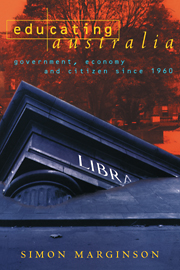10 - Civics, citizenship and difference
Published online by Cambridge University Press: 05 June 2012
Summary
‘It is important that the next generation fully appreciates what it means to be an Australian and that they understand our history and our cultural diversity. The report of the Civics Expert Group released in December 1994 has been given scant attention by the Labor Government. The Coalition is committed to ensuring that students leave school with an understanding of, and pride in, what it means to be an Australian citizen; with a knowledge of our system of government and democracy with the knowledge and skills to enable them to participate as active citizens in the community.’
Liberal and National Parties, policy on Schools and TAFE, March 1996 election, p. 9.Prelude: Education for complete living (1937 and 1994)
In August and September 1937 the Australian Council for Educational Research (ACER) organised conferences of the New Educational Fellowship in the seven capitals of Australia. The ACER hoped by opening local education to the global effects of educationists from Britain, North America and Europe to foster a new spirit of reform and renewal. Later it published the proceedings as Education for complete living (Cun-ningham 1938). Conference speakers covered almost every subject, though little was said about the education of girls, and less about indigenous and cultural diversity: it seemed that the task was to extend a singular system of education to the whole population, not to diversify it.
Information
- Type
- Chapter
- Information
- Educating AustraliaGovernment, Economy and Citizen since 1960, pp. 245 - 258Publisher: Cambridge University PressPrint publication year: 1997
